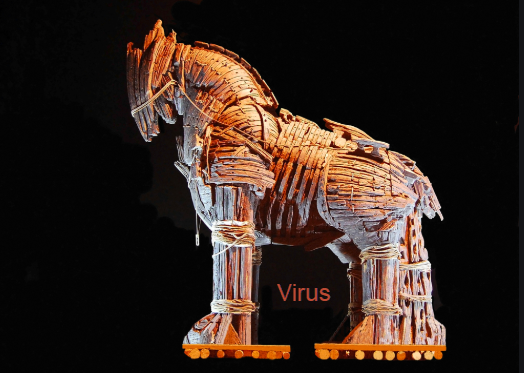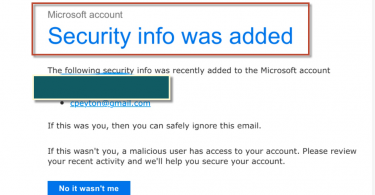Microsoft account security info was added “Microsoft account security info was added” is a stealthy computer threat that can spy on you, steal sensitive private data, distribute other viruses, or use your computer for BitCoin mining...
Category - Trojan
What is a Trojan?
A Trojan horse virus is a type of malicious code that uses deception in order to trick users into allowing it on their computers. The name is derived from the Ancient Greek tale, in which a wooden horse was allowed into the besieged city of Troy under the guise of a trophy. But as it turned out, the horse was actually filled with enemy warriors who ended up capturing and destroying the city.

The Trojan Horse Virus
So, the comparison here is that Trojan viruses pretend to be something they’re not. And once they have entered their victim’s system, they are free to execute their true purpose.
Now as to what that may be, the possibilities are numerous. Trojan horse viruses are incredibly versatile and can be programmed for a wide range of different malicious tasks. We will cover these in a little more detail further on in this post, but a brief list of what they are capable of includes theft, spying, data corruption and performance disruption.
Aside from their versatility, Trojans are also known for being rather difficult to detect as they rarely have any symptoms. And although we do call this malware type ‘viruses’, that is a misnomer and it’s good to know that Trojans aren’t actually the same thing as regular viruses. One important distinction between the two is that unlike regular viruses, Trojans cannot self-replicate.
How does a Trojan infect you?
The answer to this question is in the name of the malicious code we’re discussing. Namely, Trojans will use a variety of disguises in order to deceive you into trusting them and installing them in your system.
For example, a Trojan horse may pose as a legitimate software application available for download on some questionable (or even illegal) website. And once you give your permission and run the executable file on your computer, it is free to perform whatever malicious task it was initially designed for.
Alternatively, and this is perhaps the more common scenario, you may receive a Trojan via email or some other messaging platform. In this case, the Trojan will be disguised as an attached file, or perhaps it may even be embedded in a link that you are asked to click on. In either instance, one click is usually all it takes to unleash the malware. If you have a message/file/link like this that you have suspicions about but aren’t entirely sure of, we have a free virus scanner that you can make use of.
What can a Trojan do?
This is where things get bizarre. Trojans are so unbelievably multifaceted, the mind boggles at the amount of potential havoc they can wreak on one’s system. Here is a list of possible usages that this malware category can be employed for, but it is by no means extensive.
- Destruction. Trojans can be programmed to downright corrupt files and even whole operating systems by formatting disks, deleting data, etc.
- Backdoor. A malicious piece of this types may be used to act as a ‘backdoor’ to your system for third parties to access it or for other malicious threats to enter (e.g. ransomware).
- Remote access. In this case, the Trojan will provide its creators with remote access to your computer and allows them to gain complete control over it.
- Banking. There are Trojans designed specifically to steal financial information from the infected computers.
- DDoS. Trojans can also be used to launch DDoS attacks in order to take down certain networks. In this case the malware will send multiple requests to the targeted web address from your computer.
- Spying. Trojan horses can very often also be used for the purpose of spying on you and/or the way you use your computer. For instance, it can take screenshots, make a list of the active applications or even log your keystrokes.
How to remove a Trojan?
As pointed out, Trojans are quite notorious for their ability to hide very well in the infected system. Some may even mimic system processes or files in order to avoid detection. So locating a Trojan in your system is by no means an easy task and is best done with the help of a professional malware scanner, such as the one you can download here.
Please feel free to search the removal guides we have developed if you know the specific Trojan that has infected you as well. They contain instructions on how to locate and delete the malware manually.
Win.malware.generic-9937882-0
Win.malware.generic-9937882-0 Win.malware.generic-9937882-0 is a dangerous Trojan Horse infection capable of employing different disguise tactics to infect your machine without warning. Win.malware.generic-9937882-0 is a type of virus that can be...
MoonBounce Malware
MoonBounce MoonBounce is one of the many viruses which belong to the Trojan horse virus category. MoonBounce is very stealthy and can be distributed by getting attached to spam emails, fake ads, malicious links, and cracked software. Since...
RegHost
RegHost RegHost is a piece of malware that is typically distributed as a file that doesn’t look harmful so that most users do not suspect it is actually a virus. RegHost can be described as a Trojan Horse and it is a threat capable of many...
Virus.Win32.Sality.AA Trojan
Virus.Win32.Sality.AA Virus.Win32.Sality.AA is actually not a typical virus – it is a Trojan Horse, which means that it doesn’t replicate its files, so finding its data, and processes, and removing them should ensure that the infection is...
Pro Acceleration Of PC Virus
Pro Acceleration Of PC Pro Acceleration Of PC belongs to the malicious software category of the infamous Trojan horses. Pro Acceleration Of PC is therefore extremely dangerous code that must be dealt with accordingly in order to minimize the...
Troj_frs.vsnta322
Troj_frs.vsnta322 Troj_frs.vsnta322 is a rogue piece of software that, upon entering your computer, will acquire Admin privileges and then initiate different harmful processes in the system. Troj_frs.vsnta322 belongs to a category of viruses known...
RedLine Malware
RedLine RedLine is a malicious program that is disguised as a harmless-looking file to trick its potential victims to download it without suspecting anything. Once inside the computer, RedLine can gain unlimited Admin privileges, modify the...
000.exe Virus
000.exe 000.exe is a software virus of the Trojan Horse category that usually spreads through different types of disguise and enters the computer without triggering any symptoms. 000.exe can be used as an espionage or as a cryptocurrency tool and it...
W32 LeChuck Virus
W32 LeChuck W32 LeChuck is a sneaky software virus that will use disguise to get itself downloaded onto your computer and then secretly launch its harmful processes. Stealthy viruses like W32 LeChuck are oftentimes used to mine BitCoin from the...


